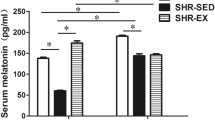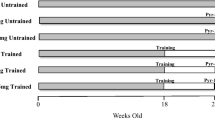Abstract
This study investigated the effects of exercise training on the regional release of endothelium-derived nitric oxide (EDNO) in spontaneously hypertensive rats (SHR). Male SHR and Wistar-Kyoto rats were divided into control and training groups, respectively. The training groups received moderate exercise by running on a drum exerciser for 60 min/day, 5 days/week for 10 weeks. At the end of experiments, thoracic aortae and common carotid arteries were excised. Acetylcholine (ACh)-induced relaxing responses due to EDNO release were evaluated in the presence of indomethacin. Vascular relaxing responses to A23187 or to sodium nitroprusside (SNP) were also studied. Our results indicated that after training, (1) the vascular sensitivity of thoracic aortae to ACh-induced relaxation was elevated when indomethacin was present; this effect was absent in the common carotid artery and it was abolished by adding Nω-nitro-L-arginine, and (2) no significant changes in SNP- or A23187-induced vascular relaxing responses, both being nonreceptor-mediated processes, were observed. We can conclude that for both hypertensive and normotensive rats, exercise training may increase receptor-mediated agonist-stimulated EDNO release in the thoracic aorta, but not in the common carotid artery.
Similar content being viewed by others
References
Andrews HE, Bruckdorfer KR, Dunn RC, Jacobs M. Low-density lipoproteins inhibit endothelium-dependent relaxation in rabbit aorta. Nature 327:237–239;1987.
Cade R, Mars D, Wagemaker H, Zauner C, Packer D, Priette M, Cade M, Peterson J, Hood-Lewis D. Effect of aerobic exercise training on patients with systemic arterial hypertension. Am J Med 77:785–790;1984.
Chen HI, Li HT. Physical conditioning can modulate endothelium-dependent vasorelaxation in rabbits. Arterioscler Thromb 13:852–856;1993.
Chen HI, Li HT, Chen CC. Physical conditioning decreases norepinephrine (NE)-induced vasoconstriction in rabbits: Possible roles of NE-evoked endothelium-derived relaxing factor. Circulation 90:970–975;1994.
Chen HI, Chiang IP. Chronic exercise decreases adrenergic agonist-induced vasoconstriction in spontaneously hypertensive rats. Am J Physiol 271:H977-H983;1996.
Delp MD, McAllister RM, Laughlin MH. Exercise training alters endothelium-dependent vasoreactivity of rat abdominal aorta. J Appl Physiol 75:1354–1363;1993.
Dohi Y, Criscione L, Luscher TF. Renovascular hypertension impairs formation of EDRF and sensitivity to ET-1 in resistance arteries. Br J Pharmacol 104:349–354;1991.
Dufaux B, Schmitz G, Assmann G, Wollman W. Plasma lipoproteins and physical activity. Int J Sports Med 3:58–60, 123–136;1982.
Fordyce DE, Farrar RP. Effect of physical activity on hippocampal high affinity choline uptake and muscarinic binding: A comparison between young and old F344 rats. Brain Res 541:57–62;1991.
Furchgott RF, Zawadzki JV. The obligatory role of endothelial cells in the relaxation of arterial smooth muscle by acetylcholine. Nature 288:373–376;1980.
Galle J, Mulsch A, Busse R, Bassenge E. Effects of native and oxidized low density lipoproteins on formation and inactivation of endothelium-derived relaxing factor. Arterioscler Thromb 11:198–203;1991.
Ikeda K, Gutierrez OG Jr, Yamori Y. Dietary NG-nitro-L-arginine induces sustained hypertension in normotensive Wistar-Kyoto rats. Clin Exp Pharmacol Physiol 19:583–586;1992.
Jennings GL, Nelson L, Esler MD, Leonard P, Korner PI. Effects of changes in physical activity on blood pressure and sympathetic tone. J Hypertens 2(suppl 3):139–141;1984.
Linder L, Kiowski W, Buhler FR, Luscher TF. Indirect evidence for release of EDRF in human forearm circulation in vivo. Blunted response in essential hypertension. Circulation 81:1762–1767;1990.
Luscher TF, Vanhoutte PM. Endothelium-dependent contractions to acetylcholine in the aorta of the spontaneously hypertensive rat. Hypertension 8:344–348;1986.
Mayhan WG, Faraci FM, Heistad DD. Impairment of endothelium-dependent responses of cerebral arterioles in chronic hypertension. Am J Physiol 253:H1435-H1440;1987.
McArdle WD. Exercise Physiology. Philadelphia, Lea & Febiger, 272–276;1986.
Miller VM, Aarhus LL, Vanhoutte PM. Modulation of endothelium-dependent responses by chronic alterations of blood flow. Am J Physiol 251:H520-H527;1986.
Palmer RMJ, Ferrige AG, Moncada S. Nitric oxide release accounts for the biological activity of endothelium-derived relaxing factor. Nature 327:524–526;1987.
Persson PB, Baumann JE, Ehmke H, Nafz B, Wittmann U, Kirchheim HR. Phasic and 24-h blood pressure control by EDRF in conscious dogs. Am J Physiol 262:H1395-H1400;1992.
Rubanyi GM, Romero JC, Vanhoutte PM. Flow-induced release of endothelium-derived relaxing factor. Am J Physiol 250:H1145-H1149;1986.
Ryan US, Rubanyi GM: Endothelial Regulation of Vascular Tone. New York, Marcel Dekker; 1992.
Sessa WC, Pritchard K, Seyedi N, Wang J, Hintze TH. Chronic exercise in dogs increases coronary vascular nitric oxide production and endothelial cell nitric oxide synthase gene expression. Circ Res 74:349–353;1994.
Sim MK, Singh M. Decreased responsiveness of the aortae of hypertensive rats to acetylcholine, histamine and noradrenaline. Br J Pharmacol 90:147–150;1987.
Sun D, Huang A, Koller A, Kaley G. Short-term daily exercise activity enhances endothelial NO synthesis in skeletal muscle arterioles of rats. J Appl Physiol 76:2241–2247;1994.
Takahashi M, Yui Y, Yasumoto H, Aoyama T, Morishita H, Hattori R, Kawai C. Lipoproteins are inhibitors of endothelium-dependent relaxation of rabbit aorta. Am J Physiol 258:H1-H8;1990.
Tipton CM, Matthes RD, Marcus KD, Rowlett KA, Leininger JR. Influences of exercise intensity, age and medication on resting systolic blood pressure of SHR populations. J Appl Physiol 55:1305–1310;1983.
Tipton CM, Sebastian LA, Overton JM, Woodman CR, Williams SB. Chronic exercise and its hemodynamic influences on resting blood pressure of hypertensive rats. J Appl Physiol 71:2206–2210;1991.
Van de Voorde J, Leusen I. Endothelium-dependent and independent relaxation of aortic rings from hypertensive rats. Am J Physiol 250:H711-H717;1986.
Yen MH, Yang JH, Sheu JR, Lee YM, Ding YA. Chronic exercise enhances endothelium-mediated dilation in spontaneously hypertensive rats. Life Sci 57:2205–2213;1995.
Author information
Authors and Affiliations
Rights and permissions
About this article
Cite this article
Chen, Hi., Chiang, IP. & Jen, C.J. Exercise training increases acetylcholine-stimulated endothelium-derived nitric oxide release in spontaneously hypertensive rats. J Biomed Sci 3, 454–460 (1996). https://doi.org/10.1007/BF02258049
Received:
Accepted:
Issue Date:
DOI: https://doi.org/10.1007/BF02258049




